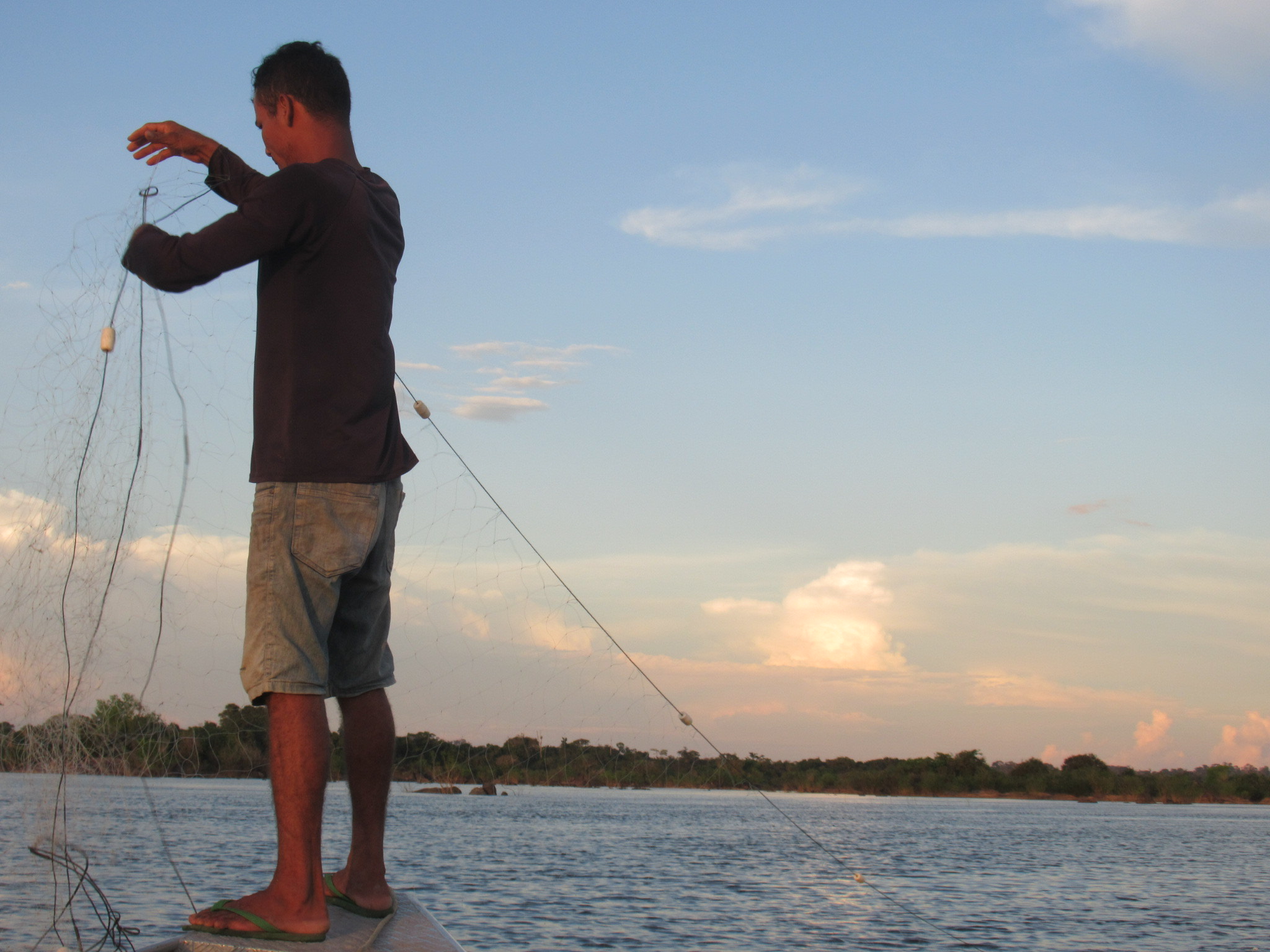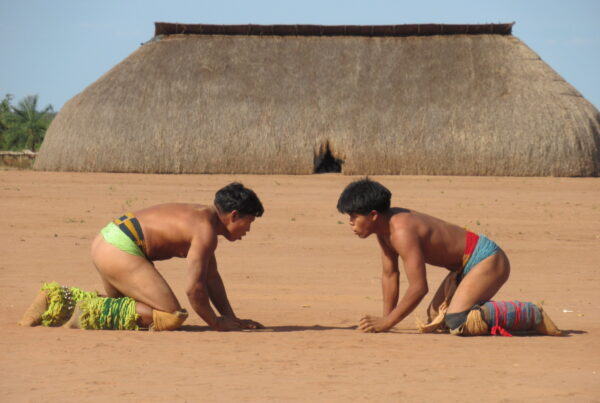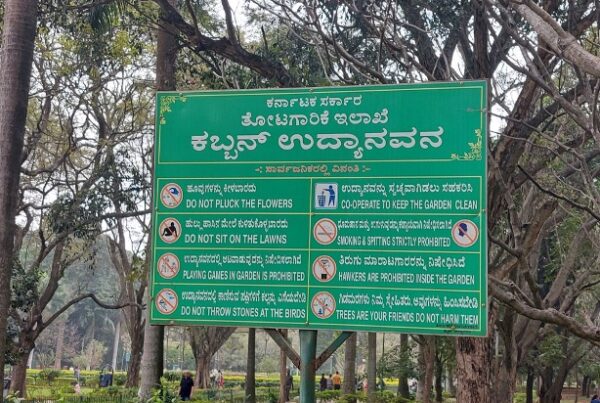by Francesco Torri.
A legacy of corporate-led destruction and divisions in the heart of the Amazon is the backdrop of a Canadian mining company’s attempt at opening the largest open pit gold mine in Brazil. As in other extractivist projects around the world, their strategy is to fracture communities and buy consent. But the local indigenous groups are aware of the risks.
The Volta Grande of the Rio Xingu, in the state of Pará, Brazil, is the last bend that the river draws before plunging into the Amazon River. It is an area of mineral and ecosystem wealth, inhabited by four indigenous communities: Arara, Juruna, Chipaia, and Kuruaia.
Over time, the wealth of the Volta Grande attracted fishermen, gold diggers, and farmers. This led to territorial disputes, often regulated by gunshots and poisoned arrows. But when the Eletrobras’ public-private consortium ‘Norte Energia’ decided to build the fourth largest dam in the world right in the heart of the Volta Grande, conflicts escalated.
Inaugurated in 2016, the dam brought nothing but problems to the communities of the Volta Grande. The river’s flow decreased by 80% in a short time, drastically altering the balance of the ecosystem in the entire region. Fish die-offs grew exponentially, the soil became less fertile, fruit on trees diminished, and communities were divided. Those who were not forced to abandon their land and move to the small town of Altamira – which soon became a crossroad for traffickers, alcoholics, and criminals – ended up living in misery.
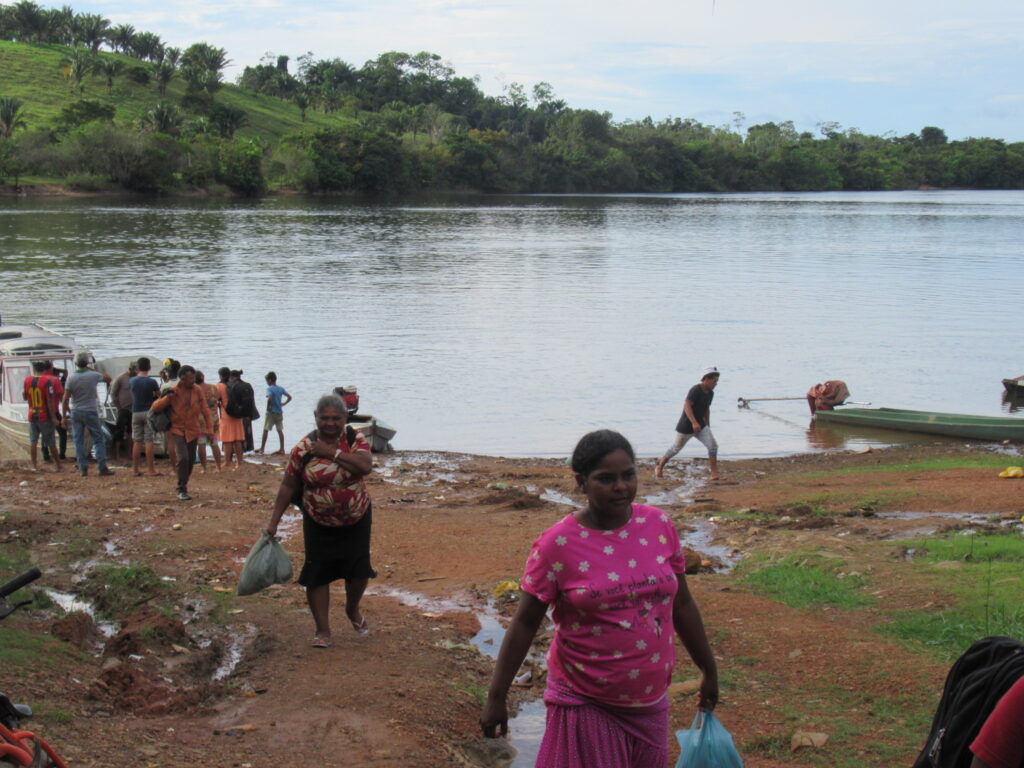
River access to Ressaca village, in Volta Grande of Xingu river, May 26th, 2023, (Credit: Francesco Torri).
Belo Sun Mining pouring salt in the wound
Today, the Canadian mining company BeloSun Mining – which emerged from the acquisition of the Verena mining company by the Forbes&Manatthan bank – is trying to take advantage of this scenario. It aims to build the biggest open pit gold mine in Brazil, right in the heart of the Volta Grande, to be operated for the next 17 years. It’s not surprising they saw in this territory a great window of opportunity: a mining potential of 4684 kg of gold per year and a fertile social ground to access lands without the risk of uprisings.
When NorteEnergia arrived in the Volta Grande to weaken resistance against the project, it applied a strategy common to many big-scale projects with serious socio-environmental impacts: creating division inside local communities by promising indemnities to whoever supported the project and incentivizing discrimination against those who opposed it. And it worked: before BeloMonte dam there were just 10 indigenous villages, now they are divided into more than 80.
For BeloSun Mining this is a great legacy to take advantage of. And it is not surprising that what we learn from the interviews with indigenous representatives of the area, conducted during our field expedition, is that the company is applying exactly the same strategy as its predecessor. “Nobody from Belo Sun Mining ever came to our territory to do consultation… they only went to the Jurunas and the Araras, organizing meetings where all the participants were given 100 reais, even kids. Now these people help the company by saying that the area where we live isn’t populated by anyone, probably in exchange for further compensation,” says Rosaria from the Chipaia people of the Volta Grande. “We live off fishing and hunting, the river and the forest are our source of life… we want to know what BeloSun is coming for, what are its impacts, and we want to be able to express our thoughts!”.
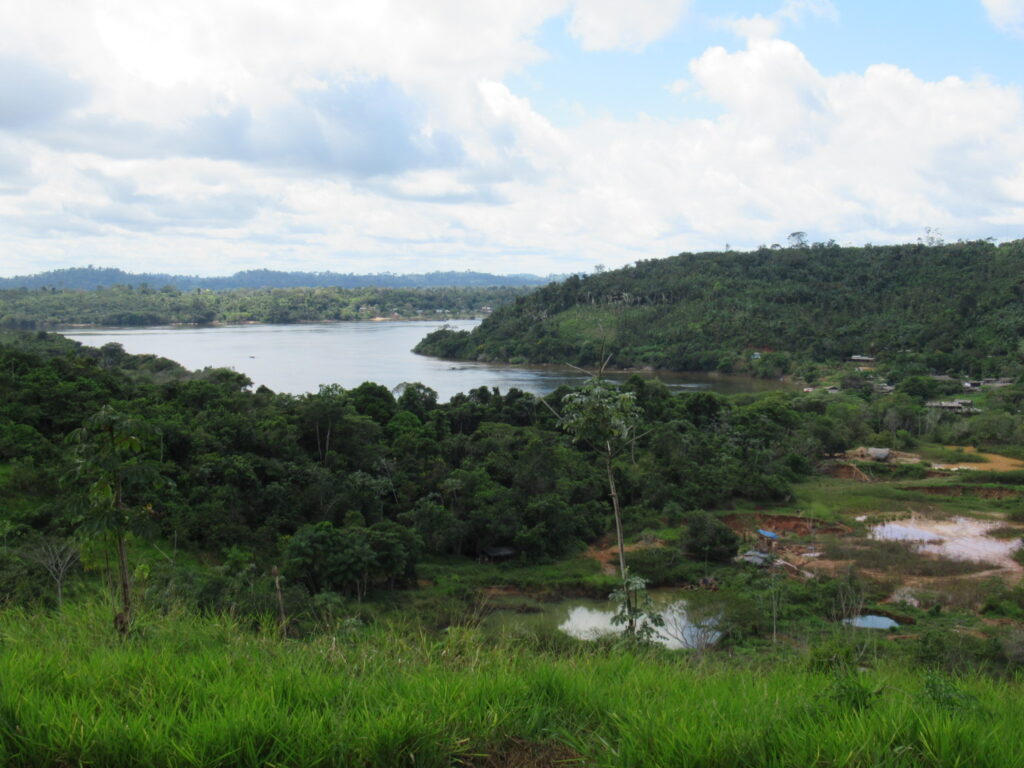
Artisanal gold mining (garimpo) in Ressaca village, June 11th, 2023 (Credit: Francesco Torri).
One of the main reasons several indigenous communities are likely not to ever be consulted is that they are further than 10km from the area of operation of the project. BeloSun Mining is shielding its social responsibility behind a piece of legislation (portaria interministerial 419/2011) mandating that only indigenous communities living in an area within 10 km of an extractivist project have to be consulted. However, everyone in the Volta Grande is aware that the potential consequences of the project could extend much further than 10 km.
Other members of the not yet consulted communities, who prefer to remain anonymous, told us they are scared to oppose the project because the company incentivizes people to harass whoever opposes it through material compensation, like gasoline, cars, and boats. One of them has already been shot twice by the neighboring landowner who was promised a high indemnity by BeloSun Mining: “They [those who support the company] don’t know that BeloSun will take ages before actually compensating them. it’s like Norte Energia, it took 12 years before they gave us an engine for our boat… they don’t know that the damages it will create will never be fully repaired… it’s impossible” he concludes.
And he is right.
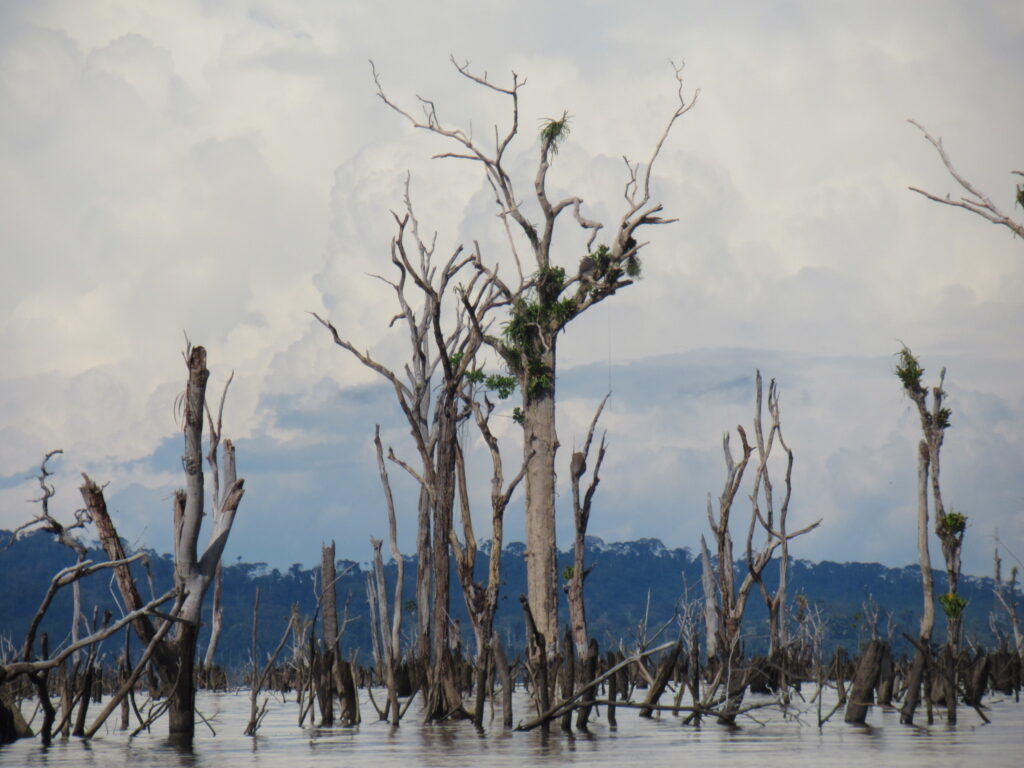
Dead trees in the Xingu River, May 20th, 223 (Credit: Francesco Torri).
Why is BeloSun’s project so dangerous?
BeloSun Mining’s project, which will extend over an area of 1.800 hectares, has a mining capacity of 50 tonnes of gold over 17 years and involves the use of 470 cubic meters of water per hour and 10.500 tonnes of cyanide. Gold mining requires the use of highly toxic metals including mercury, cyanide, and arsenic. If dispersed in the environment, these could have harmful consequences for humans and the environment. Mercury, for example, when it interacts with certain bacteria in the environment, is transformed into methylmercury, which can quickly move up the food chain to fish, and then to humans. If ingested by humans, methylmercury causes damage to the central nervous system. In children, this results in cerebral palsy and motor dysfunction, while in adults in insomnia, depression, and vision and hearing impairment.
Of such toxic waste, BeloSun Mining states in its environmental impact study that it plans to generate a mountain about 200 meters high, protected by a tailings basin to be erected on the banks of the Xingu River. A highly risky project, in violation of all safety standards, to which NorteEnergia itself has spoken out against.
Adding to the fear of some of the indigenous communities of VoltaGrande is the omission in the Canadian company’s environmental impact study of data on the seismicity of the area where it intends to build the settling basin. Data that is normally essential to establish the viability of such a project.
Today, thanks to independent studies carried out by partners of the local NGO Xingu Vivo, we know that this omission conceals a frightening reality: the area chosen by the project is considered to be at high risk of seismic leaks.
And what would be the consequences if the settling basin was to collapse? To get an idea, one only has to look at the recent history of environmental disasters in Brazil.
In 2019, for example, the Brumadinho disaster, which operated with a toxic waste settling system equal to the one BeloSun Mining ‘s proposes to use, caused the death of almost 300 people and the ecocide of the Río Paraoapeba.
In 2015 in Mariana, one of Brazil’s worst environmental disasters was caused by the failure of a facility similar to the one planned by BeloSun, located 60 km from the Rio Doce River.
But in the case of BeloSun, the consequences could be even worse. The toxic waste generated would lie less than 2km from the Xingu River, a tributary of the Amazon River. This means that if the settling basin was to fail, it would only be a matter of time before the BeloSun Mining contamination would reach the Atlantic Ocean.

Hunting trip with Chipaya indigenous leader, June 9th, 2023 (Credit: Francesco Torri).
Belo Sun’s unfulfilled obligations towards indigenous communities
As of now, due to the lack of consultations with traditional communities, the Canadian company is missing the license necessary to start its operations. The regional court reconfirmed on April 25th 2023 a decision taken in 2017 to not concede the license to the company for not fulfilling the obligation imposed by the 169 ILO convention. This convention, which has direct legal effects in Brazil, requires extractive businesses to consult traditional communities and get their “free, previous, and informed” consent.
One may think that since the company has no license, and has not accomplished its duty to consult traditional communities, there is currently not much to worry about.
However, what has been learned during our field investigations is that the company is already impacting the lives of the people of the Volta Grande as well as its ecosystem.
Once again, we see that transnational companies disregard the legality of the countries they operate in. They work through corruption and violence, covering their activities with images of fake corporate responsibility to attract investors. They ruin the lives of thousands of people and destroy ecosystems just for self-enrichment purposes. And what they leave behind is just misery.
But this is not a surprise at all. That’s how transnational extractivist companies have worked in the Amazon since the beginning of their neo-colonialist encroachment in the 60’s. It’s enough to remember the Chevron-Texaco case in Ecuador, or the atrocities of US coal company Drummond in Colombia to see that the methods used by BeloSun are picked from an historical legacy of corporate bad practices, indeed necessary to exploit resources unsustainably and in disregard of basic human rights.
But to put an end to this plague we need more than innovative pieces of legislation and climate friendly treaties: we need supportive processes of grassroots resistance and indigenous conservation strategies. It’s not Ecuador’s inclusion of the rights of nature in its constitution that is posing an end to oil extractivism in the Sucumbios and Orellana river as much as Brazil green mining regulations will not prevent BeloSun from grabbing land in the Volta Grande and from disseminating conflicts among local communities. Instead, it’s the fight of farmers, fishermans, indigenous leaders, lawyers, activists, journalists and film-makers that from the frontlines attempt to prevent further destruction. To them we should lend our support.
_
Francesco Torri is an investigative journalist trained in environmental law, currently reporting on socio-environmental conflicts linked to the misconducts of multinational companies. You can follow him on Instagram @resistance_voices.
Image on top: Fishing on the Xingu river, June 10th, 2023 (Credit: Francesco Torri)


